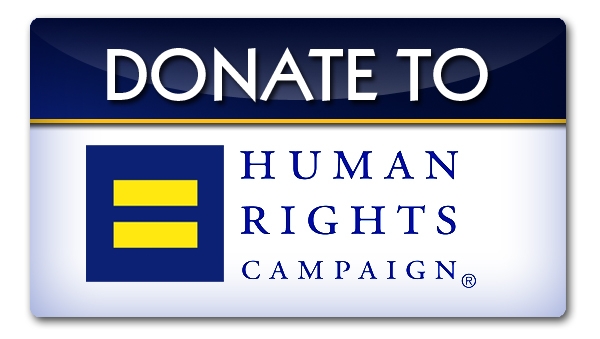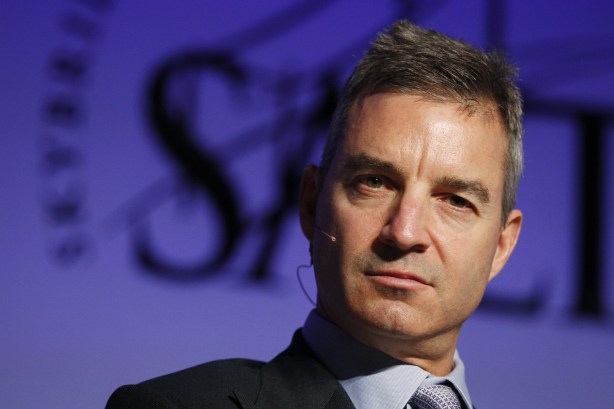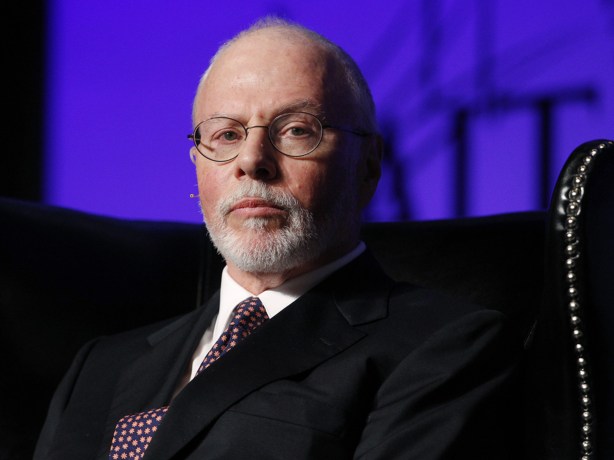It’s been an interesting year for the HRC. With the repeal of DOMA and the advances for marriage equality in many places in the US, their longtime cause of marriage equality has seen unprecedented success. The masses of people who changed their Facebook and Twitter photos to a red equals sign during the wait for the Supreme Court’s ruling was a good indicator that the HRC has become visible and gained traction with the mainstream, including people who had never even heard of them six months before.
But the HRC’s visibility has been unwelcome for many members of the community it claims to advocate for. There is a long and contentious history between HRC and the trans* community; HRC was the last civil rights organization to endorse a gender-identity-inclusive ENDA back in 2004, and ultimately didn’t maintain their endorsement of it. TransGriot notes that when HRC called an all-trans* panel to discuss trans* unemployment in 2008, they neglected to include any black or African-American trans* people, despite the fact that black trans* people suffer twice the unemployment rates of other trans* people. At the height of the backlash against Wall Street and big banks for their lack of accountability during the recession, HRC presented Goldman Sachs with a “Workplace Equality Innovation Award” at a $650-per-plate dinner. Recently, undocumented queer activist Jerssay Arredondo says that HRC asked him to stay silent about his undocumented status at a White House rally.
HRC has also been criticized by many for, put simply, becoming the face of assimilation politics. It’s an organization led by a white cisgender gay man, bolstered by celebrity and corporate sponsors, which focuses a bulk of its efforts on issues relevant to white, cisgender power elites. The fact that HRC seems to be interested more and more exclusively in same-sex marriage and in raising lots of money for this issue — even when the source of that money is a drone manufacturer — but often joins the fight for it late and ineffectively, has raised questions for many. Specifically, the question of whether or not the HRC is actually interested in intersectional queer equality.

The stakes were raised on that question this week when HRC announced that it’s going to begin doing its work on an international scale, with help of the Paul E. Singer Foundation and the Daniel S. Loeb Family Foundation. What work is that? Well:
In keeping with HRC’s mission to end discrimination against LGBT people, the grants will help fund efforts to educate Americans on the human rights of LGBT people around the world; provide fellowships at HRC for foreign LGBT advocates; expose the work of prominent anti-gay American organizations that have pushed anti-gay laws and legislation overseas; and leverage its relationships with American policymakers, faith communities, corporations and other change agents to help protect the human rights of LGBT people abroad.
In addition to being namesakes of foundations, Paul Singer and Daniel Loeb are also actively involved in the HRC’s new project. They are described, respectively, as:
A strong advocate for LGBT equality, Mr. Singer has most recently worked with HRC to advance LGBT rights in the United States, including the organization’s efforts to achieve marriage equality. He is also a founding member of American Unity PAC, an organization dedicated to supporting GOP candidates who support marriage equality.
and:
A long-time advocate for human rights, Mr. Loeb worked closely with Governor Andrew Cuomo and the New York Legislature on the state’s successful effort to legalize marriage equality in 2011. He has supported similar efforts throughout the country and helped return marriage equality to California by becoming an early funder in 2010 of the historic Perry lawsuit sponsored by the American Foundation for Equal Rights.
Outside of his involvement with HRC, Daniel Loeb is a hedge fund manager worth $1.5 billion personally. In terms of issues relating to gay rights, Loeb’s work seems to be entirely centered around marriage; his organization was one of the signatories on the amicus brief sent to the Supreme Court in support of marriage equality, but it’s unclear what else he’s done in concrete terms. Loeb has donated to PACs related to Obama and Harry Reid, but has also donated to “Straight Talk America,” a PAC created by John McCain, and the “Every Republican is Crucial” PAC, which is committed to keeping the House Republican. Loeb has used a variety of unorthodox tactics in the business world, chief among which is his habit of writing vitriolic letters to CEOs and heads of companies that he takes issue with that delineate their failings. In a recent Vanity Fair profile, Loeb is described as hostile and extreme; although he describes himself as an “activist investor,” he also does things like play both sides of a teacher’s union controversy by asking to manage the teacher’s union pension fund while also supporting an organization that opposes teacher’s pensions. Although it is, of course, impossible to plumb the depths of anyone’s true political or ethical leanings from a distance, the evidence doesn’t suggest that Loeb has ever put his money behind something for any reason than to make more money as a result of it.

Things get even more interesting when we look at Paul Singer. Also a hedge fund manager, Singer is an even larger donor to Republicans and their causes than Loeb; he underwrote the last GOP National Convention and Wall Street Journal claims that his hedge fund is one of the nation’s biggest sources of political donations full stop, and the majority of it is to Republicans. In addition to his politically conservative donations, Singer has also donated to the National Gay and Lesbian Task Force Action Fund, which may or may not be related to the fact that his son is gay, and was married to his partner in Massachusetts. Singer donated almost $1 million for marriage equality in New York, divided between his own money and funds he raised; he also donated $250,000 to the Maryland Marriage Campaign. He encourages support of gay marriage and workplace equality among Republicans and on Wall Street, and in 2012 he donated $1 million to the “American Unity” PAC, which was created to “encourage Republican candidates to support same-sex marriage, in part by helping them to feel financially shielded from any blowback from well-funded groups that oppose it.” The year before, Singer had donated $1 million to Mitt Romney’s Super PAC, “Restore Our Future.” Mother Jones has an excellent breakdown of other highlights of Singer’s resume, including orchestrating the selection of Paul Ryan as Romney’s runningmate and donating to the Koch brothers’ projects.
That’s an awful lot of money! Is it all made via being extraordinarily gifted at hedge fund management? Well, sort of. Scott Long at A Paper Bird has done a lot of research on how Singer’s money is made, and the answers aren’t flattering. Singer engages in a specific kind of investment that involves buying large amounts of debt from countries (usually developing nations) that are struggling economically, and then waiting until they’re more financially stable to collect on the debt, adding on millions and millions of dollars in extra fees and marked-up interest. It’s called a vulture fund, and it’s an accurate descriptor. Basically, much of Singer’s fortune comes from taking advantage of developing nations when they’re in a transitional or chaotic state, and then flying away with all the money he can carry as soon as they’re back on their feet, regardless of whether it pulls the country’s feet out from under it once again. And this is the money that the HRC is going to use to go back to, in some cases, those very same nations and “save” their queer people. As Long says, “It’s a sick irony that the money HRC takes to fund its new work in the Third World is made off the backs of Third World suffering.”

The three powers that be — the HRC, Loeb, and Singer — seem to have two major elements in common: an interest in same-sex marriage and a real gift for raising money. Most of the victories actually attributable to the HRC in any way are marriage equality-related; marriage also seems to be the primary focus of Loeb and Singer’s donation and activism. Will this be the right set of skills to accomplish the kind of work and fight the kinds of injustices that they’re interested in on a global scale? The two issues that the HRC outlines in its blog post announcement are the violence against queer people in some African nations and the anti-gay laws in Russia:
Being gay is still criminal in 76 countries, and in five countries plus parts of Nigeria and Somalia, being gay is punishable by death. Some countries, like Uganda and Nigeria, are taking steps backward to further criminalize LGBT people. And countries like Russia have recently passed laws to criminalize support of the dignity and humanity of the LGBT community.
It’s not immediately clear how the experience garnered by fundraising for marriage equality would translate into the context of Uganda, Somalia, or Russia. The challenges of working towards basic human safety and, eventually, equal rights for queer and gay people in those nations are complex, and informed by centuries of historical and cultural context. So far, there’s no evidence that seems to suggest that the HRC has taken steps to understand the sociopolitical and cultural contexts of the queer communities in its own country. If the organization doesn’t see why it would be important to include black trans* voices in a conversation about unemployment, or why a trans* flag belongs at a marriage equality rally, or why Jerssay Arredondo’s undocumented status is related to his queer identity in important ways, how are they going to understand the constellation of political, cultural and historical factors that lead to anti-gay violence in Uganda, or murders of trans* women in Central America, or corrective rape in South Africa? If they don’t understand any of those issues, how can they help fix them?
If the HRC did look into those cultural and historical factors, they might be aware of the ways in which the plight of gay people abroad has often been worsened, not improved, by US involvement. For instance, in Uganda, one of the nations the HRC identifies as being needful of its aid, the anti-gay sentiment and violence that threaten gay Ugandans can be traced back pretty easily to American religious evangelists. Part of the HRC’s stated mission seems to think about addressing this; they do say that they’ll “expose the work of prominent anti-gay American organizations that have pushed anti-gay laws and legislation overseas.” It would be a daring move for them, though, given the fact that the conservative billionaires who back anti-gay legislation and leadership abroad are probably attending many of the same parties and expensive fundraising dinners as Loeb and Singer. People like members of “The Family,” the ultra-powerful religious conservative group, are more likely to be sitting next to Singer at a gala than being exposed by him. And based on their track record, the HRC is more likely to ask them for money than expose them for anything, either. As Teju Cole talks about in “The White-Savior Industrial Complex,” the kind of activism that the HRC is announcing it will perform doesn’t take into account the agency or wishes of the people in the countries they’re trying to “save;” a more ethical and effective kind of action would be to address the ways in which America and American money are implicated in human rights abuses abroad. But the fact that the HRC is choosing to fund its project with money made by trying to bankrupt developing nations as they attempt to stabilize makes that feel like an unlikely possibility.
There doesn’t seem to be any real indication anywhere that the HRC is the best organization for this job, or that they have really anything in the way of experience or networks to effect real change abroad. In fact, once could argue that their belief that they do functions as a sort of litmus test: if you think you’re qualified to address all problems of violence and inequality for queers all over the globe, no matter how different they are or how disparate their root causes, it’s probably a sign that you aren’t. So if they aren’t going to be any good at it, why is the HRC interested in doing this work abroad at all?
As Scott Long pointed out, a quote from Paul Singer might hold a clue: “Some of the worst offenders in [the area of oppression of LGBT people] also happen to be the same regimes that have dedicated themselves to harming the United States and its democratic allies across the globe.” It’s convenient, then, for US homeland security and defense concerns that a US organization has reason to insert itself into another nation’s state of affairs. It also begins to look familiar: the pattern of showing up at another nation’s doorstep with an abundance of resources in tow and announcing that you’re going to save their beleaguered (and often implied to be “backwards”) people looks a lot like colonialism done in the name of saviorism, but with some serious perks in the form of imperialism. The fact that the HRC has a strong history of looking out for its own interests before those of the community and making decisions that affect many without asking for input and the fact that Loeb and Singer have both demonstrated a willingness to make their fortunes by capitalizing on inequity make it clear that this new project is likely going to benefit its organizers more than the people it’s ostensibly helping.
The HRC has proven an incredible ability to raise money for queer causes and to create narratives about gay lives and families that the mainstream can relate to. Unfortunately, they haven’t yet developed the ability to truly dialogue with or understand the diverse, intersectional communities that they want to represent, and therefore put their skills as an organization to meaningful use. Until the HRC can truthfully consider its crusading a success at home, maybe it should reconsider repeating its mistakes elsewhere — for many people around the world, the stakes are a lot higher than wedding bells.







